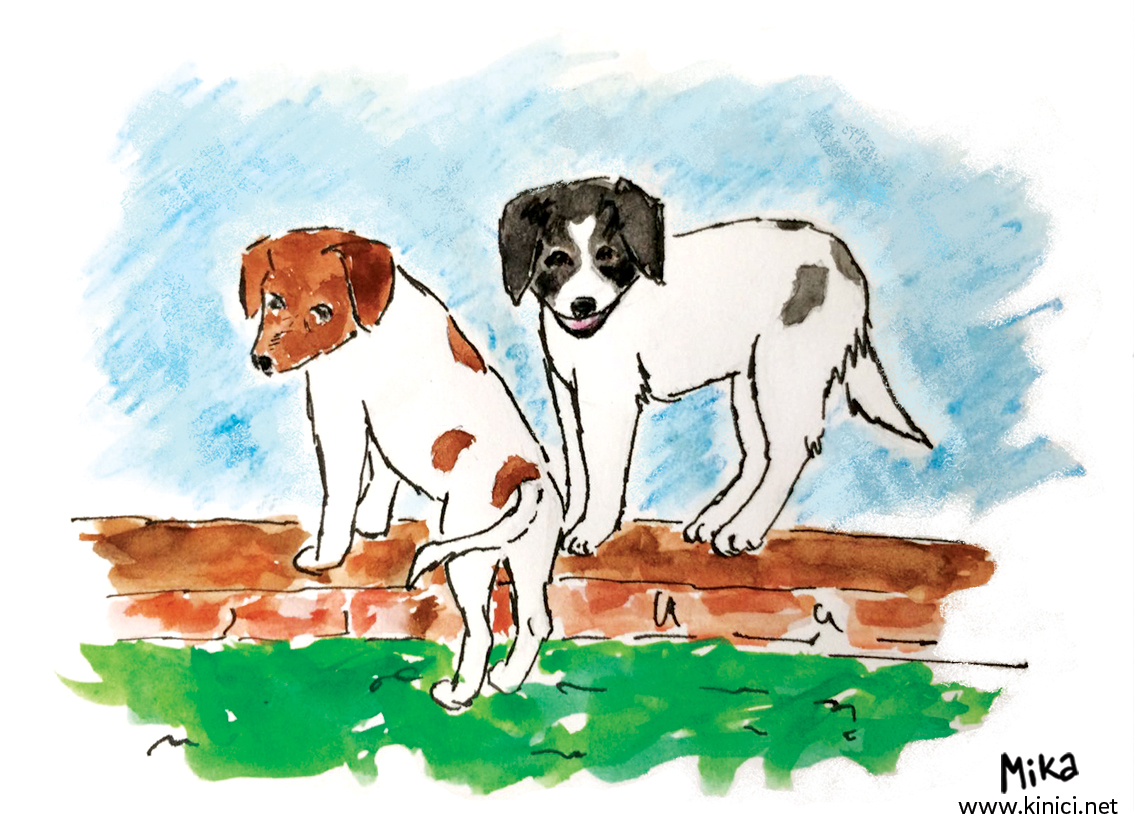 Cubs are born completely helpless, blind, deaf, commonly without any teeth and huge crave for mother's milk. Length, hight and wight differs from species to species, but even if it is any canid in question they look more alike when they are small than grown. Newborn wolf is only about 20 cm long from tip of its snout to tip of its tail. Its tail is thin, the snout is short which helps forming narrow opening of the mouth needed to make vacuum for suckling. The ears are flopped like in any newborn dog. The cub is covered with delicate fur. The weight of a newborn wolf is 400–500 g, which increases by 160 g per day. Wolf cubs must eat every couple of hours and drink 30 ml a day. When they are hungry they shriek. When they feel cold they will instinctively look for warmer spot - they will get close to their brothers and sisters or mother. At this point they will perfect the skill of milk suckling. Wolves begin howling at 11 days of age. In two weeks they develop sense of smell. After 12–14 days they open their eyes. By the third week, they mostly eat and sleep. Around one month old their sight is good and they move awkwardly. This is when they start wagging their tails, although they were physically able to do so earlier, but now they are developing communication skills. They start to hear too, but they are still quite helpless. They begin to recognize mother, brothers and sisters. One month old, the nervous system develops fully and first teeth start to grow. They will stop suckling two and a half months old. After that, regurgitation (expulsion of food used to feed the young) takes an important role in their diet. It is additionally stimulated by cubs, which lick adult's snout, taking a begging pose – low set head, ears to the back, raised front paw as a gesture of a plea. With species that live in smaller packs, groups or even solitary lives, like coyotes and foxes, cubs end suckling period earlier. Foxes have all teeth out by 14 days after birth. They start eating meat early on, and only a month or month and a half old they will exit the den to play with comfort.
Cubs are born completely helpless, blind, deaf, commonly without any teeth and huge crave for mother's milk. Length, hight and wight differs from species to species, but even if it is any canid in question they look more alike when they are small than grown. Newborn wolf is only about 20 cm long from tip of its snout to tip of its tail. Its tail is thin, the snout is short which helps forming narrow opening of the mouth needed to make vacuum for suckling. The ears are flopped like in any newborn dog. The cub is covered with delicate fur. The weight of a newborn wolf is 400–500 g, which increases by 160 g per day. Wolf cubs must eat every couple of hours and drink 30 ml a day. When they are hungry they shriek. When they feel cold they will instinctively look for warmer spot - they will get close to their brothers and sisters or mother. At this point they will perfect the skill of milk suckling. Wolves begin howling at 11 days of age. In two weeks they develop sense of smell. After 12–14 days they open their eyes. By the third week, they mostly eat and sleep. Around one month old their sight is good and they move awkwardly. This is when they start wagging their tails, although they were physically able to do so earlier, but now they are developing communication skills. They start to hear too, but they are still quite helpless. They begin to recognize mother, brothers and sisters. One month old, the nervous system develops fully and first teeth start to grow. They will stop suckling two and a half months old. After that, regurgitation (expulsion of food used to feed the young) takes an important role in their diet. It is additionally stimulated by cubs, which lick adult's snout, taking a begging pose – low set head, ears to the back, raised front paw as a gesture of a plea. With species that live in smaller packs, groups or even solitary lives, like coyotes and foxes, cubs end suckling period earlier. Foxes have all teeth out by 14 days after birth. They start eating meat early on, and only a month or month and a half old they will exit the den to play with comfort.
New place to play for curios wolf cubs is rendezvous (meeting point). Here, they develop their hunting skills, throwing themselves at each other, pouncing on mice and insects and playing with their brothers and sisters. At the same time they are forming hierarchy between themselves. 15 weeks along, they establish dominant and submissive relations. 4–10 months old they are roaming so much they might as well join adults for hunt. 10 months old, wolves can eat by themselves, some migrate, but most stay with a pack at least for some time, some even forever. They are fully matured by the age of two.
